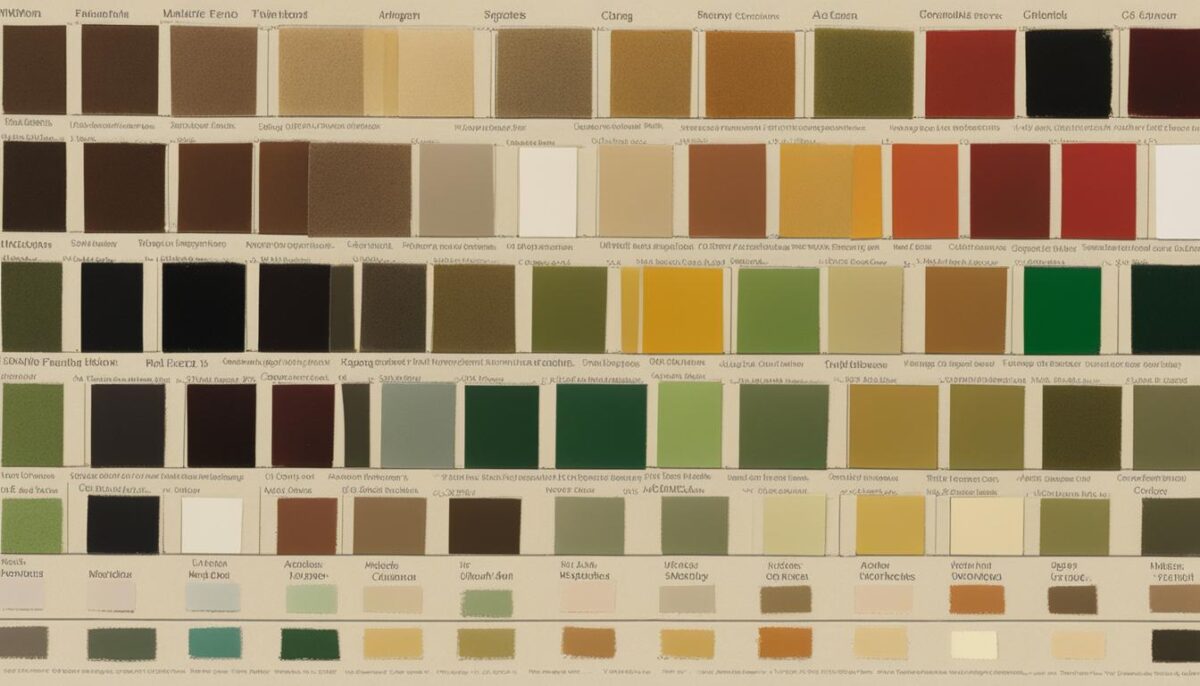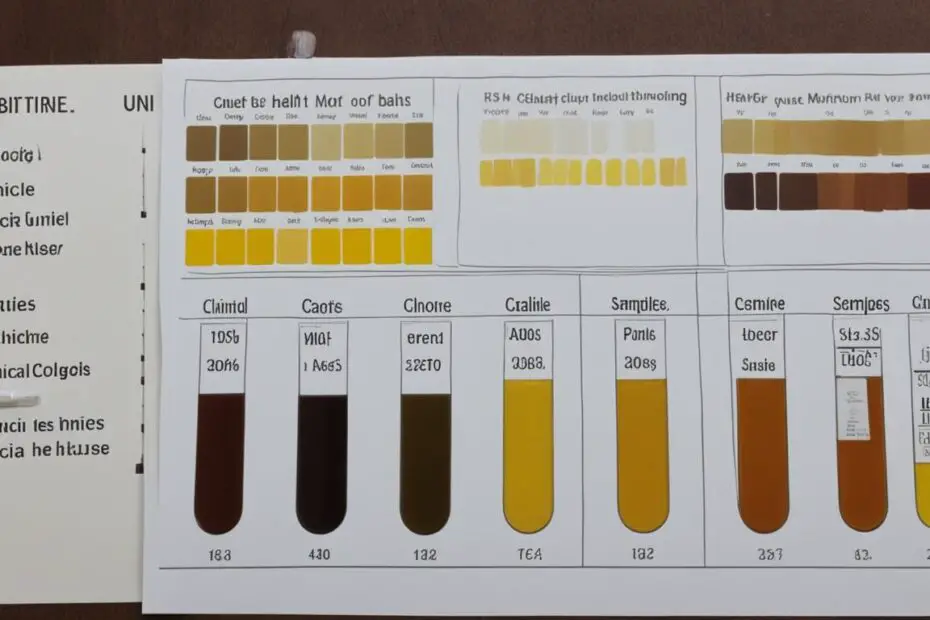As a responsible rabbit owner, it’s essential to monitor your furry friend’s health. One valuable tool for assessing your rabbit’s well-being is observing their urine color. The range of rabbit urine colors can vary, and understanding what is normal and what might indicate potential health issues is crucial for their overall care.
Whether you’re a new rabbit owner or have had rabbits as pets for years, having a rabbit urine color chart can be extremely helpful in detecting changes and abnormalities. This chart acts as a visual guide to identify variations in urine color, enabling you to identify potential health concerns early on.
By learning how to interpret the different colors and variations in rabbit urine, you can better understand your rabbit’s urinary health and provide them with the necessary care. Let’s dive deeper into the world of rabbit urine colors and what they might indicate:
Key Takeaways:
- A rabbit urine color chart is a valuable tool for monitoring your rabbit’s health.
- Understanding the normal range of rabbit urine colors and variations is essential.
- Abnormal urine colors can indicate potential health problems.
- Creating a rabbit urine color chart can help you track changes and abnormalities over time.
- Regularly monitoring your rabbit’s urine and seeking veterinary attention when necessary is crucial for their well-being.
Understanding Normal Rabbit Urine Colors
When it comes to monitoring your rabbit’s health, understanding what is normal for their urine color is crucial. Normal rabbit urine can range from yellow to golden orange, depending on various factors such as diet, hydration levels, and overall health. It’s essential to familiarize yourself with these color variations to ensure your rabbit’s well-being.
Dehydration can lead to darker and more concentrated urine, while a diet high in certain foods can cause a brighter orange color. Therefore, observing the color of your rabbit’s urine can provide insights into their hydration status and dietary intake.
Additionally, it’s worth noting that rabbit urine may appear slightly murky at times due to the passage of excess calcium. This is a normal occurrence and does not necessarily indicate any health concerns.
However, it’s essential to be vigilant about any significant changes in the appearance of your rabbit’s urine. If the urine becomes excessively cloudy or murky, it could be a sign of a more serious bladder condition. In such cases, consulting a veterinarian is recommended for proper diagnosis and treatment.
The Effects of Dehydration on Rabbit Urine Color
Dehydration can impact the color of rabbit urine, causing it to become darker and more concentrated. To ensure your rabbit stays properly hydrated, provide fresh water at all times and monitor their water intake. If you notice a significant change in their urine color, it may indicate a need for increased water consumption or a veterinary evaluation.
“Understanding the normal urine color for rabbits helps pet owners identify potential health issues early on, leading to prompt veterinary care and improved overall well-being.”
| Urine Color | Normal Range | Possible Causes |
|---|---|---|
| Yellow | Normal urine color for rabbits | Hydration, diet |
| Golden orange | Normal urine color for rabbits | Hydration, diet |
| Dark yellow | Possible dehydration | Inadequate water intake |
| Murky | Normal due to passing of excess calcium | Excess calcium in diet |
| Excessively cloudy or murky | Possible bladder condition | Requires veterinary evaluation |
Being aware of the normal urine color range for rabbits empowers pet owners to identify potential health issues early on, leading to prompt veterinary care and improved overall well-being. By monitoring and understanding what is typical for your rabbit’s urine color, you can provide better care and ensure their good health.

Decoding Abnormal Rabbit Urine Colors
Rabbits can have a wide range of urine colors, and it’s important to pay attention to any abnormal colors that may indicate underlying health issues. Here’s a guide to decoding and understanding abnormal rabbit urine colors:
Red Rabbit Urine:
Red urine in rabbits is often harmless and caused by pigments in their diet. Certain foods rich in pigments, such as beets or paprika, can give the urine a reddish hue. However, if the red color persists or is accompanied by other symptoms, it’s crucial to consult a veterinarian for a proper evaluation.
Brown Rabbit Urine:
Brown urine in rabbits may indicate dehydration. When a rabbit is not drinking enough water, their urine becomes concentrated and darker in color. It’s crucial to ensure that your rabbit has access to fresh water at all times and encourage them to stay hydrated.
Transparent Rabbit Urine:
Transparent urine in rabbits can be a sign of several issues. Excessive water consumption, often caused by underlying kidney problems, can result in transparent urine. If you notice your rabbit drinking an excessive amount of water or their urine consistently appears transparent, it’s important to seek veterinary advice for a proper diagnosis and treatment.
White Rabbit Urine:
Occasional white urine in small amounts is normal for rabbits and usually indicative of a calcium deposit. However, if you observe frequent occurrences of white urine, it’s crucial to consult a veterinarian as it may be a sign of a more serious calcium imbalance or urinary issue.
Cloudy Rabbit Urine:
Cloudy urine in rabbits can indicate bladder stones or a urinary tract infection. If you notice persistent cloudiness or changes in urine consistency, it’s essential to seek veterinary attention promptly. The vet will be able to determine the underlying cause and recommend appropriate treatment.
Remember that changes in your rabbit’s urine color should not be ignored. Monitoring your rabbit’s urine and seeking veterinary advice for any abnormal colors or accompanying symptoms are crucial for maintaining their health and well-being.

Creating a Rabbit Urine Color Chart
Monitoring your rabbit’s urine color is an essential way to keep track of their health. By creating a rabbit urine color chart, you can easily note any changes in urine color and quickly identify potential health issues. This chart will serve as a useful reference and aid in communicating with your veterinarian.
To start creating your rabbit urine color chart, you will need a method for recording and organizing the data. A simple spreadsheet or notebook can be used to record the date, time, urine color, odor, and any other observations. By regularly checking your rabbit’s urine and recording these details, you can establish a baseline for what is considered normal for your pet.
It is important to keep the chart visually appealing and organized. This will make it easier for you to interpret the data and identify any patterns or abnormalities. Additionally, having a well-structured chart will make it easier to share the information with your veterinarian if needed.

Remember to interpret the recorded urine colors correctly. A rabbit urine color chart can provide valuable insights into your rabbit’s health, but it is essential to understand the significance of the colors you observe. If you notice any sudden or persistent changes in urine color, it is wise to consult your veterinarian for further evaluation and guidance.
By diligently monitoring and recording your rabbit’s urine colors, you can play an active role in their overall health. The rabbit urine color chart is a powerful tool for early detection of potential health issues, allowing for timely intervention and treatment. Stay vigilant and use the chart as a valuable resource to ensure the well-being of your furry companion.
| Date | Time | Urine Color | Odor | Observations |
|---|---|---|---|---|
| MM/DD/YYYY | HH:MM AM/PM | Golden orange | Mild | No abnormalities |
| MM/DD/YYYY | HH:MM AM/PM | Yellow | Mild | No abnormalities |
| MM/DD/YYYY | HH:MM AM/PM | Red | Faint | Monitor for any changes |
Interpreting Rabbit Urine Colors
Interpreting rabbit urine colors is an important skill for rabbit owners to ensure their pet’s health and well-being. By understanding what is normal for your specific rabbit and recognizing any changes in urine color, you can identify potential health concerns early on.
Normal rabbit urine colors typically range from light yellow to amber, depending on various factors such as diet, hydration levels, and overall health. Observing variations within this range is usually considered normal. However, certain deviations may require closer attention.
Urine Color Indicators:
- Dark Yellow or Concentrated Urine: This could indicate dehydration and may require increased hydration for your rabbit.
- Red or Brown Urine: These colors may be indicative of blood in the urine, possibly signaling a more serious underlying condition. Immediate veterinary attention is necessary in such cases.
- Strong or Foul Odor: A strong or unpleasant odor could be a sign of an infection or other urinary issues. It is important to address these concerns promptly.
- Changes in Urine Frequency: Any significant changes in your rabbit’s urine frequency should be noted and discussed with a veterinarian.
- Cloudiness or Presence of Sediment: Urine that appears cloudy or contains sediment might indicate bladder stones or a urinary tract infection. Veterinary attention is required in these instances.
By closely monitoring your rabbit’s urine and noting any abnormalities, you can detect potential health issues and seek appropriate veterinary care. Prompt action based on urine color indicators can contribute to maintaining your rabbit’s urinary health and overall well-being.

“Interpreting rabbit urine colors is key to maintaining your pet’s health.”
Tips for Maintaining Rabbit Urinary Health
To ensure the well-being of your rabbit’s urinary health, it is important to implement a few key practices. By providing a balanced diet, ample hydration, and a clean environment, you can help prevent urinary issues and promote overall urinary health.
The Rabbit Diet for Urinary Health
An important aspect of maintaining rabbit urinary health is the diet. Pay attention to the calcium intake in your rabbit’s diet, as excessive amounts can lead to the formation of urine sludge or bladder stones. To prevent this, make sure your rabbit’s diet includes enough fiber and limit calcium-rich foods such as alfalfa and certain leafy greens. Consult with your veterinarian to determine the ideal diet for your specific rabbit’s needs.
Hydration for Optimal Urinary Health
Proper hydration is crucial for maintaining rabbit urinary health. Ensure that your rabbit has constant access to fresh water at all times. Additionally, offering leafy greens with high moisture content, such as lettuce or cucumbers, can help increase their hydration levels. Adequate hydration helps prevent concentrated urine and promotes normal urinary function.
Keeping a Clean Environment
A clean living environment is essential for preventing urinary issues in rabbits. Regularly clean your rabbit’s enclosure, removing any soiled bedding or waste. This helps minimize the risk of bacterial growth, which can lead to urinary tract infections. Additionally, providing a spacious and stimulating environment with toys and hiding places encourages regular exercise and helps maintain healthy urinary function.
Spaying Female Rabbits
Female rabbits are at a higher risk of developing reproductive problems that can lead to blood in the urine. Spaying female rabbits can help prevent these issues and promote urinary health. Consult with your veterinarian to determine the appropriate time and method for spaying your rabbit.
By following these tips and incorporating them into your rabbit’s routine, you can help maintain their urinary health and prevent potential issues. As always, consult with your veterinarian if you have any concerns or notice any changes in your rabbit’s urinary habits.
Conclusion
Monitoring your rabbit’s urine color is crucial for maintaining their overall health. By utilizing a rabbit urine color chart and regularly checking their urine, you can identify early signs of potential health issues and promptly seek appropriate veterinary care.
Understanding what is considered normal for your specific rabbit and being able to recognize any changes in urine color, odor, or behavior is vital in ensuring their well-being. By establishing a baseline for your rabbit’s urine through consistent monitoring, you can easily spot any abnormalities that may indicate underlying health problems.
Remember, if you have any concerns or notice significant changes in your rabbit’s urine, consulting a veterinarian is the best course of action. They possess the expertise to provide accurate diagnoses and appropriate treatment options to ensure your rabbit’s continued health and happiness.
FAQ
What is a rabbit urine color chart?
A rabbit urine color chart is a visual guide that helps monitor a rabbit’s health by recording and interpreting the color variations of their urine.
What are normal rabbit urine colors?
Normal rabbit urine colors can range from yellow to golden orange, which can be influenced by diet, hydration levels, and overall health.
What are some abnormal rabbit urine colors to watch out for?
Abnormal rabbit urine colors to watch out for include red, brown, transparent, white, and cloudy urine, which may indicate potential health issues.
How can I create a rabbit urine color chart?
You can create a rabbit urine color chart by recording the date, time, urine color, odor, and any unusual observations in a spreadsheet or notebook.
How do I interpret rabbit urine colors?
Interpreting rabbit urine colors involves understanding what is normal for your specific rabbit and recognizing any changes that may indicate health concerns.
How can I maintain good rabbit urinary health?
Maintaining good rabbit urinary health involves providing a balanced diet, ample hydration, a clean environment, and spaying female rabbits to prevent reproductive problems.
Why is monitoring rabbit urine color important?
Monitoring rabbit urine color is important as it can help detect early signs of potential health issues and ensure the overall well-being of your rabbit.


